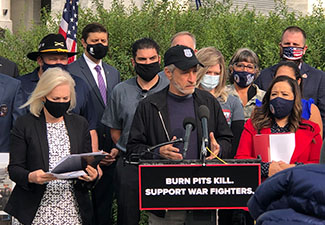Understanding the Major Richard Star Act
| Watch combat-wounded veterans speak out about the Major Richard Star Act |
The Major Richard Star Act would allow veterans who were forced to medically retire due to combat or combat-related injuries to receive their disability compensation and full retirement pay without offset.
When service members suffer wounds in the line of duty, their sacrifice doesn’t end when they come home — and the nation’s commitment to them shouldn’t either. Yet under current law, those who were forced to retire early due to combat-related injuries are denied the full benefits they’ve earned and are required to forfeit part of their retirement pay.
Congress can stop the wounded veteran tax by passing the Major Richard Star Act. This bipartisan bill ensures combat-wounded veterans receive both their disability benefits and full retirement pay. Supporters see this as a long-overdue fix that promotes fairness for those who sacrificed so much.
How Are Veterans Being Penalized?
Veterans forced to medically retire due to combat or combat-related injuries do NOT receive their full military retirement pay from the Department of Defense (DoD) and their full disability compensation from the Department of Veterans Affairs (VA).
Their DoD retirement pay is offset – dollar for dollar – by the amount of the VA disability pay they receive, resulting in some veterans receiving no retirement benefits at all.
What Benefits Does the Major Richard Star Act Provide?
This legislation allows veterans to choose whether to stay in the Combat-Related Special Compensation (CRSC) program or opt out and receive their VA compensation and the entirety of their military retirement pay. Veterans can choose the option that makes the most financial sense for them.
What Is CRSC?
Combat-Related Special Compensation provides tax-free payments to retired veterans with combat-related disabilities. To be eligible, veterans must meet the following criteria:
- Must be retired.
- Have a disability rating of at least 30% (for Chapter 61 retirees).
- Have a service-connected disability caused by combat, hazardous duty, training for combat, or exposure to instruments of war.
To apply, a veteran must first apply for service-connection through the VA and also apply directly through their branch of service (Marines must apply through the Department of the Navy) for CRSC. Your branch then decides whether your service-connected disabilities are eligible for CRSC payments.
Veteran FAQs
I was medically discharged/separated from the military. Do I qualify?
No. The bill only affects veterans who were either medically retired due to combat or combat-related injuries and eligible for CRSC, or those who retired after 20 years of service but are also receiving CRSC for a combat-related injury.
If I qualify, what happens when Congress passes the bill?
Veterans who qualify for CRSC and the benefits offered under the Major Richard Star Act will receive a letter during the “open season” period (Jan. 1-31). This letter will allow them to stop receiving CRSC and begin receiving their Concurrent Retirement and Disability Pay (CRDP) from DoD if they choose.
Will I be eligible for back pay if the Major Richard Star Act passes?
No, the bill is not retroactive.
Why would I stay with CRSC?
Every veteran’s financial situation is unique and depends on factors such as length of service or rank. It’s important to note that CRSC payments are tax-free but may be reduced by things like monthly Survivor Benefit Plan (SBP) premiums or court-ordered garnishments. Because of these differences, every veteran should have the option to choose what works best for their individual needs.
How do I choose the best option for me?
Each year during “open season,” veterans will receive a letter showing the amounts they could receive under both benefit options. Since retirees can only choose one option, the letter allows them to select the best one for them.
Setting the Record Straight: Myths and Misconceptions
Resources to Support the Major Richard Star Act
Below you’ll find resources to help you raise awareness and advocate for the Major Richard Star Act. Use these resources to learn more, spread the word, and speak out against the unfair offset.
Downloadable Fact Sheets and Guides
|
Quick Guide to the Major Richard Star Act This easy-to-read one-pager explains how the bill would end the unfair retirement pay offset for medically retired combat veterans — ideal for any audience. |
|
Veterans Impacted by State See how many medically retired combat veterans are affected by the unfair offset in each state. Use this map to understand and share the nationwide impact of the issue. |
Share on Social Media
Use this social media toolkit to help advocate for the Major Richard Star Act. Share sample posts, graphics, and key facts to raise awareness and support our nation’s veterans.
Major Richard Star Act Social Media Toolkit | Support Our Veterans
Contact: Kaitlyn McCue, Public Relations, kmccue@woundedwarriorproject.org, 904.870.1964 About Wounded Warrior Project
About Wounded Warrior Project
Wounded Warrior Project is our nation’s leading veteran services organization, focused on the total well-being of post-9/11 wounded, ill, or injured veterans. Our programs, advocacy, and awareness efforts help warriors thrive, provide essential lifelines to families and caregivers, and prevent veteran suicides. Learn more about Wounded Warrior Project.


